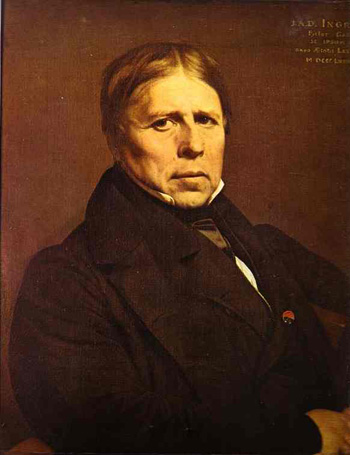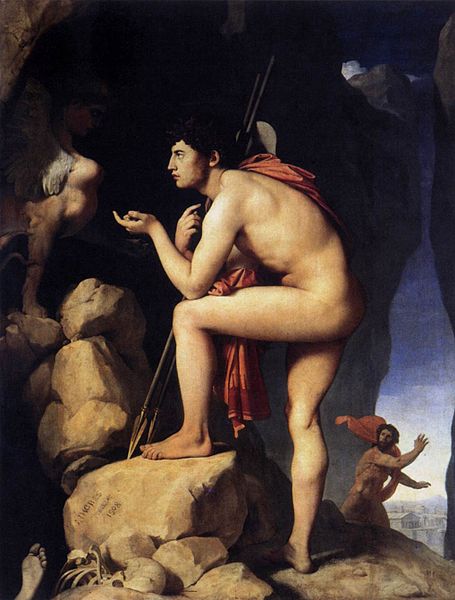Jean-Auguste-Dominique Ingres, Notes and Thoughts on Art
Robert Goldwater and Marco Treves, Artists on Art from the XIV to the XX Century, (New York, Pantheon Books, 1945), pp. 215-216, 218-219.
Jean Auguste Dominique Ingres (1780-1867) was perhaps the most influential French
Jean-Auguste-Dominique Ingres, Self-Portrait (1858)
artist during his life time. He was a powerful force in the French Academy for Art, and he served for some years as the Director of the French Academy in Rome. He was a strong classicist, who argued for the important of drawing as a preparation for painting, and he strongly opposed the emphasis on color and feeling in painting influenced by Romanticism, such as those of his younger rival, Eugene Delacroix.
After Ingres' death this friend, Vicomte Henri Delaborde, collected the painters' opinions on art from his letters, official documents, and conversations. Below are a few examples.
Thoughts on Using This Source
Ingres opinions, quoted below, can give you a window into the way that 19th century classicists viewed culture. To get at his perspective, here are a few suggestions:
- Pay attention to what Ingres values. Ask yourself, what he likes and want to increase and what does he dislikes.
- Compare his ideas about art with other notions of what produces great art. Ask yourself what models of great art are like today and how these are different from Ingres
- Think about the practical consequences of these views, coming as they are from one of the real powers in the art world. What kind of message is being sent to young artists? What kind of work is apt to received support from the artistic establishment?
Jean-Auguste-Dominique-Ingres, Oedipus and the Sphinx (1808-1825) |
SONS OF HOMER
It must not be thought that the exclusive love which I have for this painter [Raphael] causes me to ape him: that would be a difficult thing, or rather, an impossible thing. I think I shall know how to be original even when imitating. Look: who is there, among the great men, who has not imitated? Nothing is made with nothing, and the way good inventions are made is to familiarize yourself with those of others. The men who cultivate letters and the arts are all sons of Homer.
ART AND THE BEAUTIFUL
There are not two arts, there is only one: it is the one which has as its foundation the beautiful, which is eternal and natural. Those who seek elsewhere deceive themselves, and in the most fatal manner. What do those so-called artists mean when they preach the discovery of the "new"? Is there anything new? Everything has been done, everything has been discovered. Our task is not to invent but to continue, and we have enough to do if, following the examples of the masters, we utilize those innumerable types which nature constantly offers to us, if we interpret them with wholehearted sincerity and ennoble them through that pure and firm style without which no work has beauty. What an absurdity it is to believe that the natural disposition and faculties can be compromised by the study -- by the imitation, even -- of the classic works! The original type, man, till remains: we have only to consult it in order to know whether the classics have been right or wrong and whether, when we use the same means as they, we lie or tell the truth.
TASTE
It is rarely other than the lower type of the arts, whether in painting or in poetry or in music, which naturally pleases the multitude. The more sublime efforts of art have no effect at all upon uncultivated minds. Fine and delicate taste is the fruit of education and experience. All that we receive at birth is the faculty for creating such taste in ourselves and for cultivating it, just as we are born with a disposition for receiving the laws of society and for conforming to their usages. It is up to this point, and no further, that one may say that taste is natural to us.
STUDY THE ANTIQUE
To claim that we can get along without study of the antique and the classics is either madness or laziness. Yes, anti-classic art, if one may even call it an art, is nothing but an art of the lazy. It is the doctrine of those who want to produce without having worked, who want to know without having learned; it is an art as lacking in faith as in discipline, wandering blindly because of its having no light in the darkness, and demanding that mere chance lead it through places where one can advance only by means of courage, experience, and reflection.
ART, NATURE, AND FASHION
Let me hear no more of that absurd maxim: "We need the new, we need to follow our century, everything changes, everything is changed." Sophistry -- all of that! Does nature change, do the light and air change, have the passions of the human heart changed since the time of Homer? "We must follow our century": but suppose my century is wrong. Because my neighbor does evil, am I therefore obliged to do it also? Because virtue, as also beauty, can be misunderstood by you, have I in turn got to misunderstand it? Shall I be compelled to imitate you!

